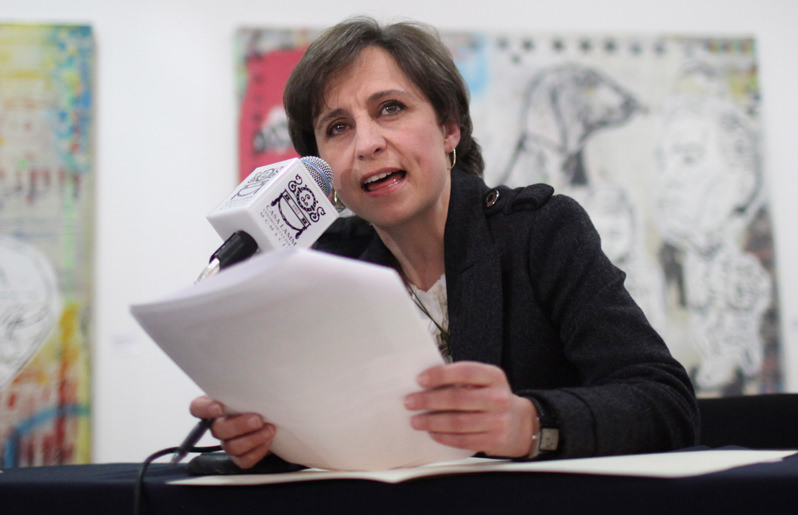Truthdigger of the Week: Carmen Aristegui
The highly regarded Mexican radio show host said that her recent firing was a case of repression of press liberties and that if privileged journalists can be attacked, "imagine the level of vulnerability for other journalists in Mexico.” Carmen Aristegui in February 2011. (AP / Alexandre Meneghini)
Carmen Aristegui in February 2011. (AP / Alexandre Meneghini)
Every week the Truthdig editorial staff selects a Truthdigger of the Week, a group or person worthy of recognition for speaking truth to power, breaking the story or blowing the whistle. It is not a lifetime achievement award. Rather, we’re looking for newsmakers whose actions in a given week are worth celebrating.
The day after the well-regarded Mexican journalist and radio host Carmen Aristegui was fired this month by MVS Communications, she showed up for work as she had every other day, only to find that her microphone had been turned off. The image seems the perfect representation of the suppression of press freedoms that is occurring in Mexico under what Aristegui calls the “restoration of authoritarianism.” With this phrase she is referring to the return to power of the historically oppressive Institutional Revolutionary Party known as PRI, under the leadership of President Enrique Peña Nieto.
MVS cites the unauthorized use of its brand to promote Méxicoleaks, a new Wikileaks-like whistleblowing website that has the Mexican political elite shaking in its boots, as the main reason behind dismissing the popular radio host and effectively silencing her voice of dissidence.
Aristegui, who was fired in 2011 from the same company after making allegations about then-president Felipe Calderón, made it into the global spotlight last November after she and her team released a report on the current Mexican first lady’s “Casa Blanca,” or White House, on Aristegui’s website, Aristegui Noticias. The article revealed that the $7 million house was being built by Grupo Higa, a firm that had received many lucrative government deals under Peña Nieto’s leadership, including part of a $4 billion contract to build a high-speed train between the states of México and Querétaro. The government canceled the contract after details of Peña Nieto and Grupo Higa’s ties came into question, thanks to Aristegui’s fierce journalistic initiative to reveal what she and her team considered to be signs of corruption.
While no proof has yet come to light to imply that the Mexican president had anything to do with the journalist’s dismissal, Aristegui and many of her colleagues are speculating just that. It is worth noting that MVS admitted that political pressure was behind Aristegui’s 2011 firing, a dismissal that lasted just 17 days before the radio host was re-hired. Yet this time around, the company is not only refusing to admit that politicians were involved but have also refused to take the journalist and her team back, even after Aristegui issued a statement calling for negotiations with her former employer. MVS also denies Aristegui’s allegations that the company asked her not to reveal the news about the Casa Blanca on its airwaves, pleading that she show some “understanding.”
Aristegui’s firing, as well as that of two other investigative reporters on her team, has been met with outrage from notable Mexican figures, as well as a Twitter storm of social media users announcing #MexicoWantsAristeguiBack. Protests were held March 16 in Mexico City, and on March 23, the trending hashtag #MexicoWantsAristeguiBack was used more than 130,000 times. Mexican celebrities including Diego Luna took to YouTube to explain why they want Aristegui’s radio show reinstated. Award-winning Mexican author and Truthdig Global Voices reporter Elena Ponatiowska writes that Aristegui’s voice has accompanied the nurse, the taxi driver, the family on its way to school, among many other Mexicans, since the 6 a.m. Aristegui Noticias show began in 2008. Poniatowska adds, “We all known Carmen Aristegui and agree on one thing: ‘She’s honest.’ And that, in this country, seems to be an unforgivable offense.”
Indeed, Poniatowska is correct that revealing the truth puts many journalists’ lives at risk in the Latin American country. Not only was Mexico ranked 148 out of 180 countries in Reporters Without Borders’ 2014 World Press Freedom Index, but Article 19, a London-based media watchdog group, “found that in Mexico, a reporter is harassed, threatened or attacked somewhere almost every day,” according to a report released this week. The New York Times reports that the group also discovered that “The frequency has risen under Mr. Peña Nieto’s government … and almost half of the attacks have been traced to government officials.”
And Aristegui made it clear as soon as her most recent firing that it was, above all, a matter of repression of press liberties and that “if privileged journalists like those in her team could be attacked, ‘imagine the level of vulnerability for other journalists in Mexico.’ ”
For her dedication to journalism and the fight for freedom of the press at a time when Mexico needs her most, and — most of all — for her well-known honesty, Carmen Aristegui is our Truthdigger of the Week.
Your support matters…Independent journalism is under threat and overshadowed by heavily funded mainstream media.
You can help level the playing field. Become a member.
Your tax-deductible contribution keeps us digging beneath the headlines to give you thought-provoking, investigative reporting and analysis that unearths what's really happening- without compromise.
Give today to support our courageous, independent journalists.






You need to be a supporter to comment.
There are currently no responses to this article.
Be the first to respond.